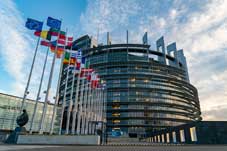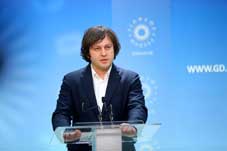
European Parliament Adopts Critical Resolution On Media Freedom and Safety of Journalists in Georgia
By Khatia Bzhalava
Friday, June 10, 2022
On June 8, following the “Violations of media freedom and safety of journalists in Georgia” debate held in the European Parliament, the legislature adopted a critical resolution on media freedom in Georgia. The resolution was initiated by 5 political groups of the European parliament, with overall 308 members of the European Parliament (MEPs) voting for the resolution and 218 against it.
The resolution focuses on the ‘extremely’ tense relations between the ruling party and critical media outlets. The European Parliament expresses its concern “over the significant deterioration of the media situation and the safety of journalists in Georgia in recent years”. It calls on the Georgian authorities to “refrain from interfering in media freedom or pursuing politically motivated judicial cases against media owners or representatives” and also to refrain from using aggressive rhetoric and discriminatory treatment toward media representatives in Georgia.
Other key issues pointed out in the resolution are - the lack of transparency and effectiveness in investigations related to crimes against journalists, the death of Aleksandre Lashkarava, a TV Pirveli cameraman, a few days after being assaulted on July 5; Significant downgrading of Georgia in the World Press Freedom Index ranking from 60th to 89th place over the year; Journalists, particularly those from media channels critical of the government, facing difficulties in accessing public information; Alleged spying on journalists by the security services.
The resolution also focuses on imposing personal sanctions on Bidzina Ivanishvili, the former Prime Minister of Georgia, “for his role in the deterioration of the political process in Georgia”. The European Parliament also expresses its concern over Ivanishvili’s exposed personal and business links to the Kremlin, which, according to EP, determine the Georgian government’s position towards sanctions on Russia.
“[EP] expresses its concern over the destructive role played by the sole oligarch, Bidzina Ivanishvili, in Georgia’s politics and economy, and the level of control he exerts over the government and its decision,” reads the resolution.
The resolution also calls on the Georgian authorities to release former president Mikhail Saakashvili from prison on humanitarian grounds in order to allow him to undergo proper medical treatment abroad.
The document expressed its concern over “the steady rise” in Russian disinformation and information manipulation in Georgia, in the context of the Russian invasion of Ukraine.
The resolution called on the Georgian authorities to resolutely uphold the highest standards of democracy, the rule of law, judicial independence, fair trials, and fundamental freedoms, including in the area of media freedom.
The Chairman of the ruling Georgian Dream party Irakli Kobakhidze has criticized the European Parliament resolution, noting that the document was “not worth a dime”. According to him, the resolution, which demands the release of Saakashvili and Gvaramia, “who are the enemies of media freedom and democracy in Georgia”, and also names Bidzina Ivanishvili as the main problem of democracy in Georgia “has nothing to do with European values”.
Kobakhidze noted that Ivanishvili was “completely distanced” from politics, and noted that he was the person who made fundamental progress in the direction of democracy, human rights, and media freedom since 2012.
Kobakhidze called it “extremely disturbing” that a high-ranking institution of the European Union “falls victim to fake news”, claiming that the resolution included factual errors and lies.
“The campaign, which has been running since 2012 to protect criminals and restore them to power, has reached one of the EU’s highest institutions, the European Parliament,” he noted.
Kobakhidze also cited reforms implemented by the Georgian Dream government, stating that because of those reforms Georgia was placed “ahead of Ukraine, Moldova and many other EU member or candidate countries” in terms of democracy and the rule of law, the fight against corruption, and trade and economic cooperation with the Union.
For the record, Georgia is still waiting for the European Commission to deliver its opinion on the country’s EU candidacy bid soon, with the European Council expected to make a final decision by the end of June.
Yesterday, the leaders of the Political Groups of the European Parliament have appealed to European Council members to decide on the applications of Ukraine, the Republic of Moldova, and Georgia to accede to the European Union. The joint statement reads that the European Union “must show courage, resolve, and vision in today’s context of a brutal war of aggression against our European neighbor Ukraine and a deteriorating international environment.”
According to the leaders, the European Union must be a reliable partner and a credible geopolitical actor that lives up to its principles and values by showing solidarity with those who stand up for the same ideals. The letter also reads that Ukrainian, Georgian and Moldovan citizens “wish to live in a free, democratic and prosperous country that is a proud and committed member of the European family” and these expectations “should not continue to be neglected.”
With the joint letter, the leaders of the European Parliament appealed to the Council to grant the candidate status to Ukraine and Moldova as a start to a “merit-based process”, and to “work towards” granting the same status to Georgia.


